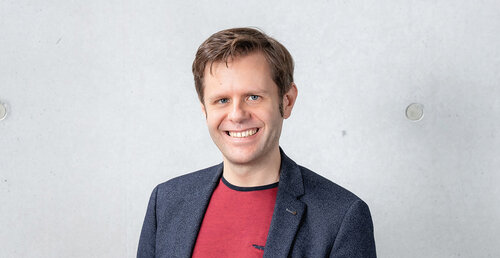
Study Guide
Welcome to our study guide. It offers you a comprehensive overview of your studies at the FH Kufstein Tirol.
Here you will find your personal contact as well as important study infos, details about internships, the academic calendar, ECTS information, the diploma supplement, the general examination regulations and information on assessment and grading.
This guide is your one-stop resource for everything you need during your time as a student.
Your Study Support TEam

Daniel Seebacher
Coordinator Study Support

Study Infos
In our student portal My Studies, you’ll find a comprehensive collection of all the key information about studying at our university. The portal serves as a guide, helping you get started, supporting you with administrative matters, and accompanying you all the way through to graduation. It also provides your personal course list and grades, essential forms and applications, as well as instructions, support, and practical tips.
INTERNSHIP
At the University of Applied Sciences Kufstein Tirol, we emphasize not only the acquisition of theoretical knowledge but also its practical application. A key part of our bachelor’s program is the mandatory internship, which provides students with the opportunity to deepen their learning in a real-world setting and gain valuable hands-on experience.
Whether in Austria or abroad, our students have access to numerous exciting internship opportunities. In Austria, they can gain insights at renowned companies, while those looking to broaden their horizons can choose to complete their internships internationally.
This practical training is a vital element of our curriculum, ensuring that graduates leave with both solid academic knowledge and the practical skills and intercultural competence needed to successfully launch their careers.
ACADEMIC CALENDAR
The teaching and vacation periods for the bachelor's and master's degree programs at the FH Kufstein Tirol:
- Semester Dates

ECTS
ECTS stands for European Credit Transfer System, a standardized points system used across Europe to measure the workload of degree programs. At FH Kufstein Tirol, students earn 30 ECTS credits per semester, or 60 credits per academic year.
ADVANTAGES OF THE ECTS SYSTEM:
-
Workload
The workload for your degree program is clear and transparent.
-
Comparability
It is easier for you to compare your achievements with those of other students in Europe.
-
Mobilität
You can collect ECTS credits and have them recognized at other higher education institutions.
Allocation
ECTS credits are awarded for a range of academic activities, including lectures, tutorials, seminars, work placements, undergraduate and graduate dissertations. These credits represent the amount of work required for each achievement, taking into account factors such as attendance, preparation and follow-up time, and self-study. This system allows for standardized assessment and comparability of academic performance within and across educational institutions and programs.
WORKLOAD PER ECTS CREDIT
In Austria, 60 ECTS credits correspond to an annual workload of 1,500 hours. This means that you have to work an average of 25 hours for each ECTS credit.
The learning load for students is regularly evaluated and adjusted if necessary.
Diploma Supplement
The Diploma Supplement is an official supplement to your final examination certificate that provides a detailed description of your qualifications. It informs potential employers and educational institutions at home and abroad about
-
the subjects you have studied,
-
the progress of your studies,
-
your academic and professional qualifications.

GENERAL EXAMINATION REGULATIONS & ASSESSMENT
The following provisions govern the degree program in terms of regulations, guidelines, examinations and final grades:
- Federal Act on University of Applied Sciences Degree Programs (University of Applied Sciences Studies Act – FHG)
- General Study and Examination Regulations
- Study regulations of the respective degree program
The general examination regulations are also referenced in the study contract; they are an integral part of the contract between the students and the FH Kufstein Tirol.
EXPECTED LEARNING OUTCOMES
-
Bachelor's Degree:
Fundamental knowledge
Solid theoretical grounding in all core business-related subjectsApplication expertise
Ability to apply expertise in practice to develop complex solutionsIntercultural competencies
Success in interactive international situations through intercultural understanding and experience -
Master's Degree:
Extended expertise
In-depth management expertise with an international focus for sound analysis, conception and researchLeadership skills
Problem-solving skills at the highest level for management positionsCommunication and conflict skills
Advanced presentations, moderation, conflict management and intercultural skillsDecisiveness
Masterful planning, decision-making and negotiation techniques



